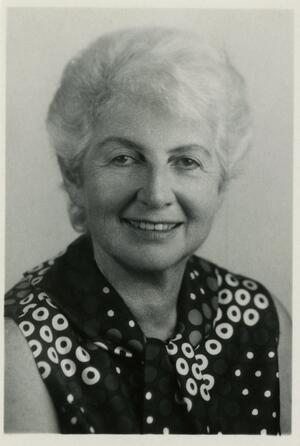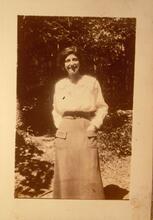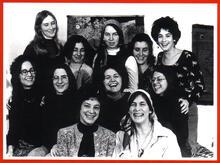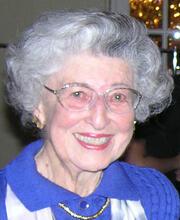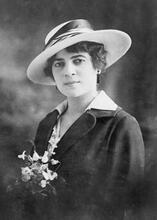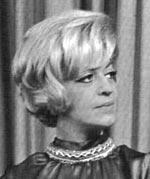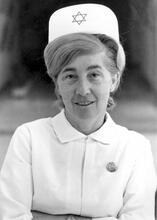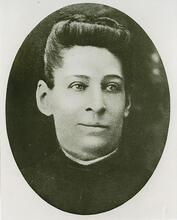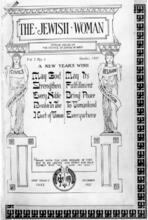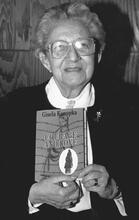Eva Salber
Eva Salber earned a medical degree from the University of Cape Town in 1938, as well as a degree in public health in 1945 and a doctorate in medicine in 1955. In South Africa, she helped establish community health centers in the wake of WWII, but she left in 1956 due to her opposition to apartheid. She then taught at the Harvard School of Public Health from 1957–1966 while working with a housing project in Boston, and at Duke University from 1971–1982 while working with the rural poor in North Carolina. Within these communities, she operated from her sense that health involved factors beyond medicine, such as safety, social ties, and other elements. She published three books, Caring and Curing: Community Participation in Health Services, Don’t Send Me Flowers When I’m Dead: Voices of Rural Elderly, and The Mind Is Not the Heart: Recollections of a Woman Physician.
Eva Salber devoted her life to working on behalf of the world’s poor and oppressed people. The ancient Jewish commandment “Be kind to the stranger” characterizes the ideals that Eva Salber pursued in her work as a physician, researcher, and writer.
Early Life and Accomplishments
Eva Salber was born in Cape Town, South Africa, on January 5, 1916, the second of three daughters of Lithuanian parents, Moses and Fannie (Srolowitz) Salber. From the University of Cape Town Medical School, she received an M.B.Ch.B. (the equivalent of an M.D.) in 1938, a diploma in public health in 1945, and a doctorate in medicine (M.D.) in 1955. She married physician Harry T. Phillips in 1939, and the couple had four children: David (b. 1943), a sociologist; Mark (b. 1946), a historian; Rosalie (b. 1950), a health care administrator; and Philip (b. 1954), an investment adviser. She taught at the Harvard School of Public Health (1957–1966) and at Duke University Medical School (1971–1982). Her honors included terms as a Radcliffe Scholar, Radcliffe Institute for Independent Study (1966–1967), as a Macy Fellow (1969–1970), and as Senior International Fellow of the Fogarty International Center, National Institutes of Health (1980).
Influence of South African Origins
As a physician, she promoted the health of poor communities by empowering patients and populations. Many of those she assisted became leaders and organizers in their own communities. Her work in a housing project in Boston and with poor rural populations in North Carolina grew out of lessons learned in South Africa, where she and her husband were pioneers in establishing community health centers after World War II. In the United States, as in South Africa, she believed fervently that health and well-being stem from one’s total life circumstances, in which medical care plays an important but limited role. Because they opposed apartheid, Eva Salber and her family left South Africa in 1956.
Scientific and Literary Works
In her scientific research, Eva Salber published close to a hundred articles in a wide variety of medical journals in Britain, South Africa, and the United States, primarily on epidemiological studies relating social factors and health, as well as related community health issues. Among her contributions were studies on infant growth in different races, socioeconomic patterns in breastfeeding, smoking behavior in schoolchildren, lactation and breast cancer, and social factors in the utilization of health services.
In a more literary genre, she used her intimate knowledge of several communities to produce two rich oral histories, Caring and Curing: Community Participation in Health Services, and Don’t Send Me Flowers When I’m Dead: Voices of Rural Elderly. All her work, both scientific and literary, is reviewed in her autobiography, The Mind Is Not the Heart: Recollections of a Woman Physician.
Eva Salber died in Chapel Hill, North Carolina, on November 18, 1990. Throughout her life, she displayed the generosity and drive for improvement of social conditions characteristic of her Jewish home and community.
Selected Works by Eva J. Salber
Caring and Curing: Community Participation in Health Services (1975).
Don’t Send Me Flowers When I’m Dead: Voices of Rural Elderly (1983).
The Mind Is Not the Heart: Recollections of a Woman Physician (1989).
American Men and Women of Science (1966–1982, 1989).
Contemporary Authors: A Bio-Bibliographical Guide to Current Writers in Fiction, General, Nonfiction, Poetry, Journalism, Drama, Motion Pictures, Television. Farmington Hills, MI: Gale Publications, 1989.
Handley-Taylor, Geoffrey and Ernest Kay, compilers. Dictionary of International Biography. Cambridge, England: International Biographical Centre, 1976.
Kay, Ernest, editor. The International Authors and Writers Who’s Who. 12th Edition. Cambridge, England: International Biographical Centre, 1991.
Salber, Eva J. Papers. William R. Perkins Library, Duke University, Durham, N.C.
Who’s Who in America (1983–1989)
Who’s Who in Health Care. New York: Hanover Publications, 1977–1990.
The World Who’s Who of Women. Cambridge, England: International Biographical Centre, 1973–1990.

